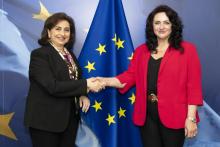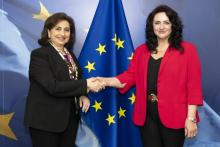
Originally published on www.eeas.europa.eu
Ten years ago, the European Union and UN Women established a solid and longstanding partnership to promote gender equality and women’s empowerment at global, regional, and national levels. Since then, this partnership has continued to grow and strengthen. With women’s rights and gender equality under increased attack, the EU and UN Women partnership is more important than ever.
EU-UN Women hand-in-hand for Gender Equality and Women’s Empowerment
Our collaboration is also demonstrated through our engagement in the Generation Equality Forum organised by UN Women and co-hosted by France and Mexico in partnership with civil society and youth.
The EU has been an invaluable supporter and partner in driving the agenda forward and continues to lead by example through its work as co-leader of the Gender-Based Violence Action Coalition and the Call to Action on Protection from Gender-Based Violence in Emergencies.
A key contribution to the Generation Equality Forum includes EU’s commitment to implement the Gender Action Plan III, EU’s ambitious gender policy framework in external action.
Together, we have worked in more than 90 countries worldwide to push for transformative change. We have worked to achieve stronger global norms and standards on gender equality, gender-responsive laws, policies and institutions, access to services for victims of gender-based violence, production and use of sex-disaggregated data, as well as women’s political participation and leadership.
The EU and UN working hand-in-hand in full partnership under the Spotlight Initiative in 26 countries and 6 different regions, is one of the biggest investments ever made to eliminate violence against women and girls and already shows impressive results.
The impact of COVID-19 has exacerbated gender inequalities, increasing violence against women and girls, rolling back progress in in all spheres of life, including employment, health and education.
UN Women Executive Director Sima Bahous and EU High Representative/Vice President, Josep Borrell. Photo: European Union 2022
Progress towards a more gender-equal world is not linear and we need to stay vigilant and committed everywhere around the world. Some of today’s crises, from Ethiopia and Yemen to Afghanistan and the war in Ukraine; all have been seriously reverting this progress. Often, narratives around war and crisis are still blind to women’s experiences. We will continue to address the structural causes of gender inequality and gender-based discrimination, including actively engaging men and boys in challenging harmful and negative gender norms and stereotypes.
UN Women Executive Director Sima Bahous and European Commissioner for International Partnerships, Jutta Urpilainen. Photo: European Union 2022
We will continue to work in the context of the critical priorities of the European Union and UN Women’s strategic plan. These include increased leadership, governance and participation in public life for women, women’s economic empowerment, ending violence against women and girls, peace and security, humanitarian action and disaster risk reduction, as well as climate change and digitalisation, innovation and technology.
UN Women Executive Director Sima Bahous and European Commissioner Helena Dalli. Photo: European Union 2022
On 20 May 2022, the EU and UN Women reaffirm their commitment to continuing the implementation of the Memorandum of Understanding of 2012 and ensure an inclusive approach that allows like-minded partners and allies to work jointly for full equality and rights of women, including with EU Member States and UN agencies. In today’s multipolar world, the EU-UN partnership, and that with UN Women carries particular political significance.
